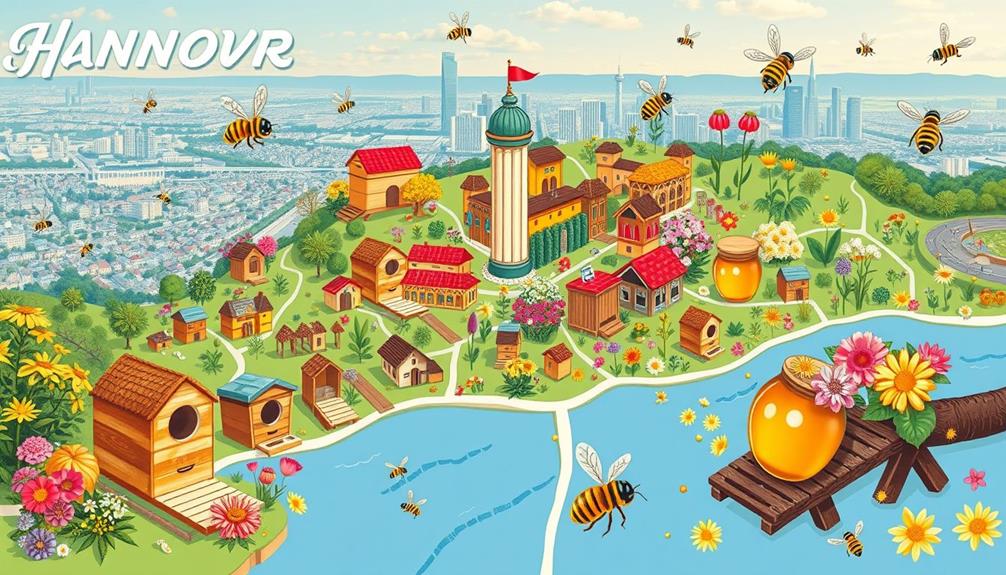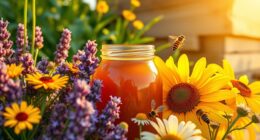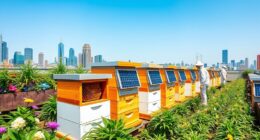You're in for a treat with Hanover's local honey map, showcasing the vibrant beekeeping community of nearly 10,000 members. Each beekeeper contributes unique honey flavors, from sweet lime to fir honey, influenced by local flora like dandelion and linden. These beekeepers engage in sustainable practices, prioritizing the health of bee populations and biodiversity. By supporting local honey, you're not only enjoying diverse tastes but also helping to preserve the environment. If you want to know more about the fascinating connection between beekeepers, their honey, and the ecosystem, there's much more to explore.
Key Takeaways
- Hanover's beekeeping community consists of 9,800 members managing 65,000 bee colonies, organized into 125 local associations for collaboration.
- Unique honey varieties in Hanover include sweet lime honey, fir honey, and seasonal floral sources like dandelion and linden.
- Sustainable practices among beekeepers prioritize organic standards, biodiversity, and community awareness about bees' ecological roles.
- Educational initiatives, including seminars and workshops, enhance beekeeping skills and promote sustainable honey production among local producers.
- Supporting local honey producers fosters biodiversity, stimulates the economy, and offers consumers unique flavors from Hanover's diverse ecosystems.
Overview of Hanover's Beekeeping Community
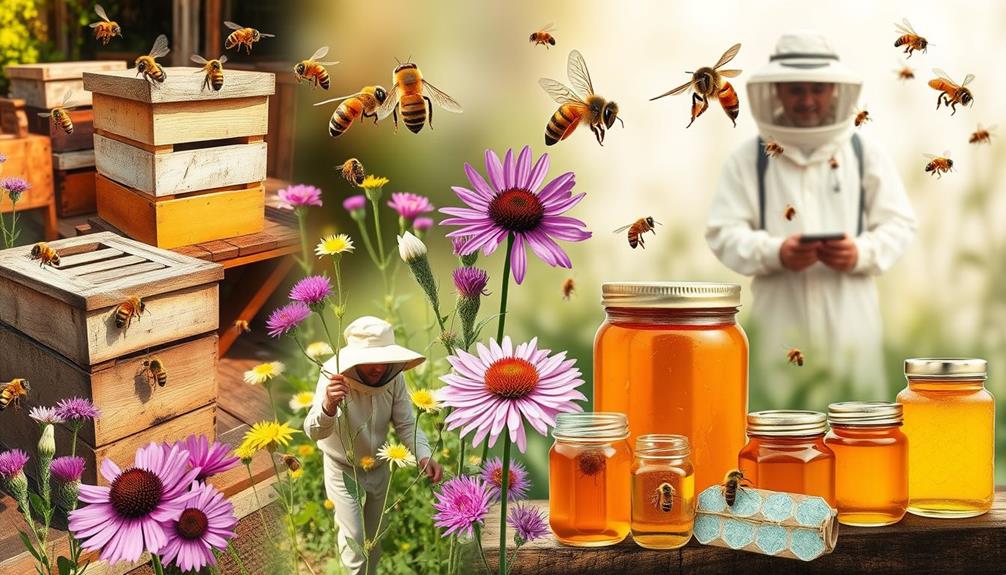
Hanover's beekeeping community is vibrant and expansive, boasting over 9,800 members who manage around 65,000 bee colonies throughout the region. These beekeepers are organized into 125 local associations and 30 district groups, covering a wide area from Cuxhaven to Göttingen and Diepholz to Lüchow-Dannenberg.
This structure not only supports individual beekeepers but also fosters collaboration and knowledge sharing among members. Additionally, these dedicated beekeepers often focus on healthy dog snacks derived from natural ingredients, enhancing both their own wellness and that of their pets.
Recent anniversaries celebrated by local associations like Imkerverein Gamsen-Kästorf and Imkerverein Kirchweyhe illustrate the community's deep-rooted tradition and commitment to the art of beekeeping. You'll find that these celebrations bring together seasoned beekeepers and newcomers alike, creating a sense of belonging.
Moreover, the Hannover Beekeepers Association (LVHI) prioritizes education through various initiatives, including seminars aimed at training speakers and enhancing public outreach.
These educational efforts guarantee that all members, regardless of experience level, have access to essential information and skills.
The annual Jahrestagung of the Society of Friends of LAVES Institute for Beekeeping serves as a key networking event, providing opportunities for beekeepers to engage with one another and collaborate on best practices.
Unique Honey Varieties of Hanover
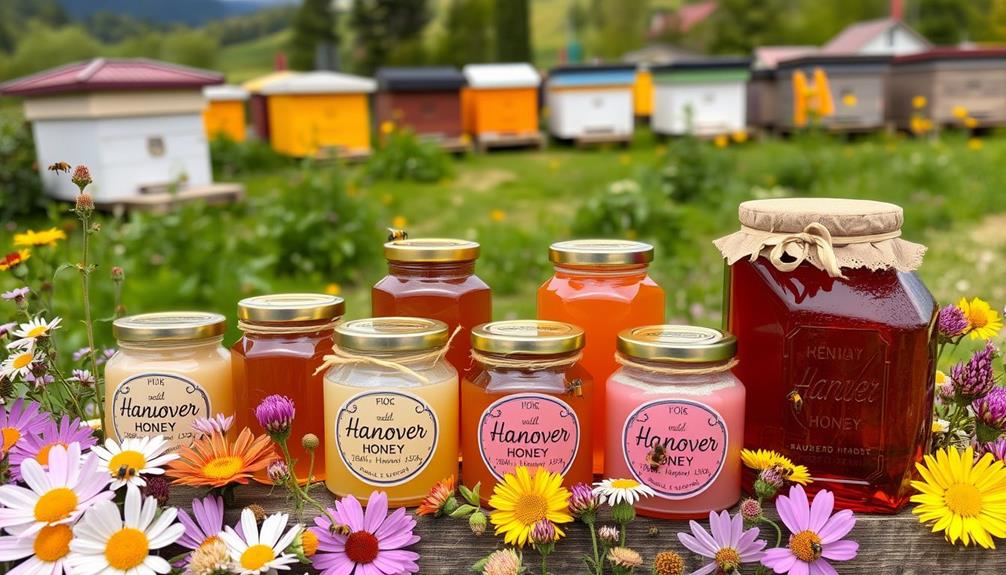
The diverse ecosystems found in the Hanover region give rise to an impressive array of unique honey varieties. You'll discover sweet lime honey, which has a delightful citrusy note, and robust fir honey, known for its earthy undertones. Specialty options like fruit blossom honey capture the essence of the region's vibrant flora, offering a taste experience that reflects the local landscape.
Additionally, the health benefits of local honey can be complemented by essential oils for respiratory health, such as eucalyptus oil, which is known for its decongestant effects. Thanks to sustainable beekeeping practices, local producers adhere to strict organic and Bioland guidelines, ensuring that the honey you enjoy is of the highest quality.
With over 9,800 members in the Hannover Beekeepers Association and around 65,000 bee colonies, the community thrives on collaboration and shared passion for honey production.
Seasonal floral sources play a vital role in shaping these unique flavors. In May, dandelion fields bloom, infusing the honey with a light, sweet character, while the linden avenues in July impart a rich, aromatic profile.
Supporting this local honey market is an online shop that offers custom honey packages, reflecting a commitment to promoting regional products and sustainable practices. You'll find that each jar tells a story of Hanover's diverse and thriving beekeeping culture.
Mapping Local Beekeepers

While exploring the local honey scene, you'll find that mapping local beekeepers reveals a vibrant network of over 125 associations in the Hannover region. This rich tapestry of beekeeping supports approximately 65,000 bee colonies, each contributing to the diverse flavors of honey available. By understanding this network, you can appreciate the unique honey varieties produced, ranging from light floral notes to robust, earthy tones.
Beekeepers often specialize in different floral sources, such as dandelions, robinia, and linden. This specialization leads to an array of honey flavors that reflect the local flora. The Hannover Beekeepers Association also offers resources, including a directory of local beekeepers, making it easier for you to find regional honey.
Here's a quick look at some popular local honey sources:
| Floral Source | Flavor Profile |
|---|---|
| Dandelion | Light, sweet, floral |
| Robinia | Mild, delicate, fruity |
| Linden | Strong, aromatic, herbal |
| Clover | Sweet, light, mellow |
| Chestnut | Rich, bold, slightly bitter |
Mapping local beekeepers not only enhances your honey experience but also supports sustainable practices in the Hannover area.
Sustainable Practices in Beekeeping

When you explore sustainable beekeeping practices, you'll discover a commitment to organic standards that prioritize bee health and biodiversity.
Local beekeepers not only adhere to these guidelines but also engage with the community to raise awareness about the essential role bees play in our ecosystem.
For example, many beekeepers focus on planting bee-friendly plants like rosemary, which attract bees and support their foraging efforts.
Organic Beekeeping Standards
Organic beekeeping standards play a crucial role in promoting sustainable practices that benefit both bees and the environment. In Germany, these practices are guided by strict Bioland guidelines, guaranteeing that you, as a beekeeper, adhere to methods that prioritize bee welfare and ecological health.
Annual compliance checks by certified inspectors verify that you maintain the necessary standards for honey and wax production, instilling confidence in your practices.
Honey and wax undergo rigorous analyses by Biocontrol, along with additional independent laboratory testing, guaranteeing quality and transparency for consumers. This careful monitoring not only safeguards the bees but also enhances consumer trust in the origins of your organic honey products.
Moreover, organic beekeeping emphasizes the importance of diverse flora and ecologically cultivated areas. By fostering a variety of plants, you enable your bees to produce specialty honeys while supporting local biodiversity.
This commitment to sustainable practices creates a positive cycle, where healthy bees thrive, and consumers enjoy high-quality honey. Embracing these standards guarantees that your beekeeping efforts contribute meaningfully to both environmental sustainability and the local ecosystem.
Biodiversity Enhancement Efforts
Fostering biodiversity through sustainable practices is a key focus for local beekeepers in Hannover. By adhering to organic certification standards, these beekeepers actively contribute to habitat preservation and environmentally friendly farming methods.
With the Hannover Beekeepers Association representing around 65,000 bee colonies, their collective effort plays a crucial role in maintaining pollinator populations essential to our ecosystem's health.
You'll find that local beekeepers engage in collaborative efforts with agricultural producers, promoting crop diversity which directly enhances pollinator habitats. This synergy supports a balanced ecosystem, benefiting both farming and beekeeping communities.
Educational initiatives, such as training seminars, highlight the importance of biodiversity and sustainable beekeeping practices, ensuring that community members and the wider public understand their significance.
Annual meetings of beekeeping associations serve as a platform for sharing best practices in sustainable methods, addressing challenges in biodiversity conservation, and fostering a sense of community.
Community Engagement Initiatives
Local beekeepers in Hannover are taking significant steps to engage their communities in sustainable practices that support both honey production and biodiversity. The Hannover Beekeepers Association plays an essential role by providing resources and training programs, helping you enhance your knowledge and skills in eco-friendly beekeeping methods.
With around 65,000 bee colonies under the association's wing, community engagement becomes critical for promoting biodiversity.
Regular seminars and workshops focus on sustainable practices, ensuring that over 9,800 members are up-to-date with the latest environmentally responsible techniques. You'll learn the importance of preserving native bee populations and habitats, while advocating for methods that minimize the impact of intensive agriculture on local ecosystems.
Community initiatives also aim at increasing public awareness of the ecological value of bees. By participating in collaborative projects, you foster a culture of sustainability among beekeepers and consumers alike.
Engaging with your local community not only strengthens your commitment to responsible beekeeping but also inspires others to appreciate the crucial role bees play in our environment. Together, you can create a thriving ecosystem that benefits both honey production and biodiversity.
Educational Opportunities for Beekeepers

If you're looking to enhance your beekeeping skills, local training seminars and workshops offer valuable opportunities.
The Hannover Beekeepers Association regularly hosts events that not only improve your knowledge but also connect you with fellow beekeepers.
Engaging in these educational initiatives can greatly boost your confidence and effectiveness in beekeeping.
Training Seminars and Workshops
Enhancing your beekeeping skills through training seminars and workshops can greatly impact your success as a beekeeper. The Hannover Beekeepers Association regularly hosts these educational opportunities to guarantee you stay updated with the latest practices in the field. For instance, on June 22, 2024, over 30 participants attended a seminar focused on public speaking and educational outreach, enhancing their skills for better community engagement.
These sessions not only improve your knowledge but also address current challenges in sustainable honey production. You'll find that networking with experienced beekeepers and industry professionals during these workshops fosters a sense of community and collaboration.
Here's a quick look at some training opportunities:
| Workshop Type | Focus Area |
|---|---|
| Public Speaking | Enhancing outreach skills |
| Sustainable Practices | Honey production methods |
| Advanced Beekeeping | Tackling current challenges |
Make the most of these training seminars and workshops to deepen your understanding of beekeeping practices and connect with other passionate beekeepers in the Hannover region. Your commitment to ongoing education can lead to more successful beekeeping ventures.
Networking and Collaboration Events
Networking and collaboration events offer beekeepers invaluable opportunities to connect and share knowledge within the community. For instance, the Jahrestagung of the Society of Friends of LAVES Institute for Beekeeping, held on March 2, 2024, brought together members, former students, and guests to foster professional relationships and exchange insights.
Additionally, on June 22, 2024, over 30 participants attended a seminar focused on training speakers. This event aimed at enhancing public speaking and educational outreach skills among beekeepers, ensuring you can effectively share your passion and knowledge about beekeeping with others.
The Hannover Beekeepers Association, consisting of 125 beekeeping associations and 30 district associations, provides numerous local networking events and educational initiatives. These events emphasize community engagement and the sharing of best practices among beekeepers, supporting your professional development.
To stay informed and connected, make sure to regularly check for updates on training programs and networking opportunities offered by local associations. Engaging in these events not only enriches your beekeeping experience but also strengthens the entire beekeeping community in Hannover.
Supporting Local Honey Producers
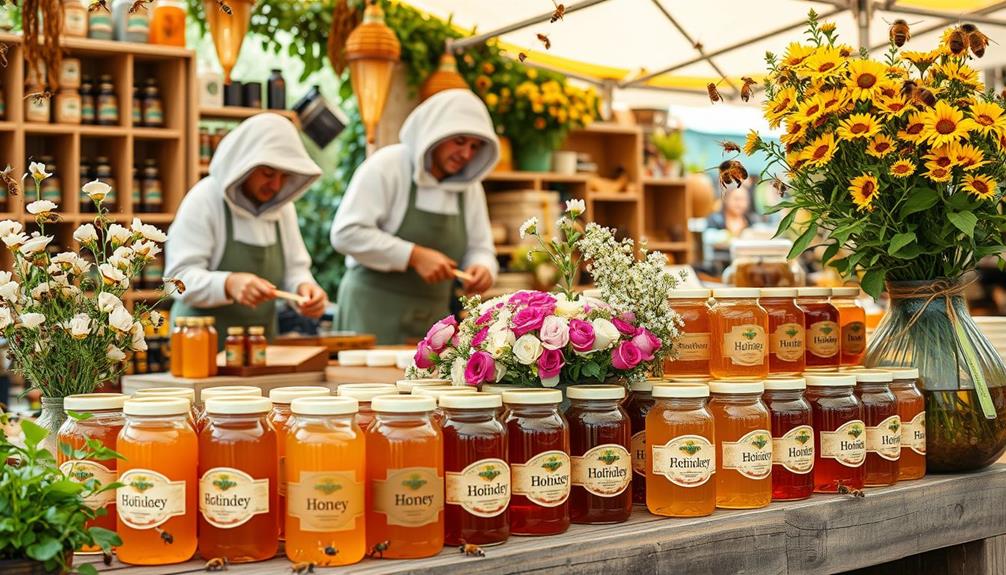
Supporting local honey producers is a sweet way to make a positive impact on both the environment and your community. When you purchase honey from local beekeepers, you're not just enjoying a delicious product; you're also supporting sustainable agricultural practices and helping conserve bee populations. These bees are essential for pollination and biodiversity, making your choice even more significant.
In the Hannover region, over 9,800 members of the Hannover Beekeepers Association manage around 65,000 bee colonies. By buying local honey, you can savor unique flavors that reflect the area's diverse flora, like dandelion and linden. Plus, your support stimulates the local economy.
Here's a quick comparison of local benefits:
| Benefit | Description |
|---|---|
| Supports Sustainable Practices | Encourages eco-friendly farming methods |
| Protects Bee Populations | Counteracts the decline caused by environmental changes |
| Variety of Flavors | Enjoy unique tastes from local flowers |
| Strengthens Community | Fosters connections and awareness about bees |
| Boosts Local Economy | Keeps money circulating within the community |
Frequently Asked Questions
What Is Considered Local Honey?
Local honey's produced within a specific area, usually within 50 to 100 miles of where it's sold. It reflects local flora, supporting nearby beekeepers and offering potential health benefits like relief from seasonal allergies.
How Much Does 500G of Honey From the Beekeeper Cost?
You'll find that 500g of honey from local beekeepers usually costs between €5 and €10. Specialty varieties might exceed €10, but buying in bulk can save you some money while supporting sustainable practices.
What Do I Need to Sell Honey?
To sell honey, you need to register your food business, comply with EU labeling regulations, guarantee hygiene standards, and consider joining local beekeeping associations for support and resources to enhance your marketing efforts.
How Much to Charge for Honey?
When pricing honey, think of it as sweet nectar from the earth. You should charge between €6 to €12 per jar, adjusting for floral uniqueness and production costs to attract discerning customers while covering your expenses.
Conclusion
In closing, as you explore Hanover's vibrant beekeeping community, picture a tapestry woven with diverse flavors and sustainable practices. By supporting local honey producers, you're not just savoring the sweetness of their hard work; you're also nurturing the environment that sustains us all. So, grab a jar of that unique honey and let each taste transport you to the blooming fields of Hanover, where every drop tells a story of dedication and passion.
